Marisa Vicosa tells the horrific tale of her 2 daughters’ murder by ex-cop father
Marisa Vicosa pointed to the photo of a child depicted on her sweatshirt. In the photo, the girl is kissing Marisa on the cheek.
“This is my youngest, Aaminah,” Marisa said. “She was 6. She wanted to be a veterinarian because she loved animals and she loved bugs. She was a loving and spunky girl, full of personality. She was super smart.”
The other photo depicts Giana with Marisa. Giana is smiling. “Giana was 7,” her mother said. “She was super smart, even smarter than her sister. Giana wanted to be a scientist and an inventor. She said she wanted to find a cure for cancer. She wanted to invent a machine that would do all the chores for me.”
Giana was studious and serious. She loved science and doing scientific experiments and solving math problems. She completed second grade in half a school year, homeschooled by her mother, an elementary school teacher. “She was a thinker,” her mother said. “You could see it in her eyes when she was deep in thought.” Aaminah was more outgoing. Giana liked to sing. Aaminah, her mother said, was “more of a dancer.”
They were beautiful girls.
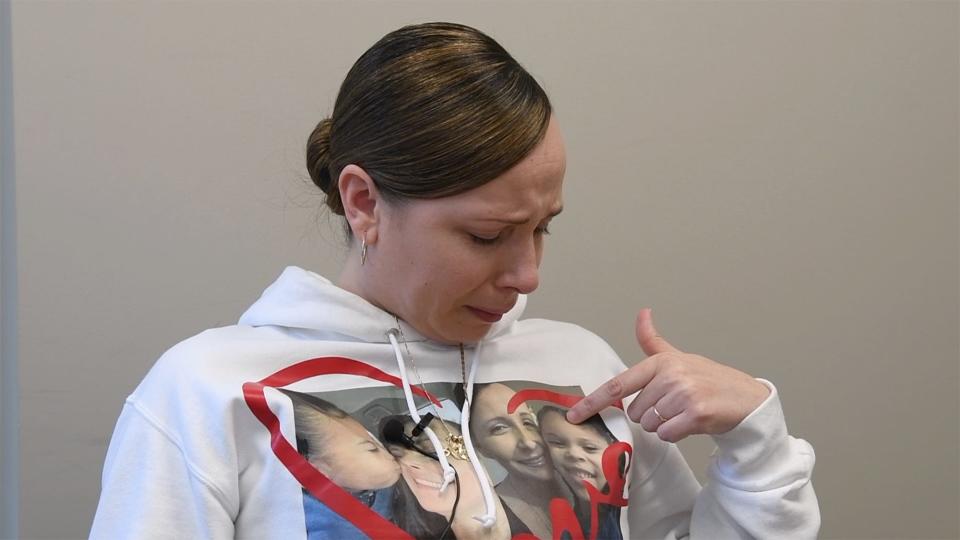
And they are gone, murdered by their father, Robert Vicosa, who killed them and his girlfriend before turning the gun on himself.
“I still have a hard time understanding,” Marisa said. “It’s like my brain...”
Her voice rattles to a stop, the words catching in her throat.
“Everything I went through is nothing compared to having to live every day without my daughters,” Marisa said, the words struggling to escape. “I’d go through it a hundred times if I could have them back.”
Struggling to understand
This is the first time Marisa has publicly shared what happened to her and her daughters that horrific week in November 2021.
While the news media followed the events breathlessly as police in Pennsylvania and Maryland scoured the region in search of her estranged husband, she was ensconced in a hotel, registered anonymously, desperately praying that her daughters would be returned to her.
The pain and grief are still with her – and always will be.
And while she struggles just to keep living, she hopes that by sharing what happened to her, and what she believes are the missteps made by the police that led to the unimaginable tragic end of that week, will lead to change.
She never wants anyone to go through what she has. No one can imagine what she has endured. By telling her story, she hopes that they can understand, even if, in the end, she struggles to understand it herself.
Previously: Torture, rape, murder & police negligence: Vicosa settlement details tragic failures by cops
The manhunt: Seven days of horror end on a rural Maryland road with two ex-cops and two girls dead
A dream life
It was her dream life.
Marisa grew up in York City, raised by a single mother; her father wasn’t in the picture. He left the family when Marisa and her three brothers were quite young and had nothing “whatsoever” to do with the family – something he now regrets, said Marisa’s mother, Diane Calhoun. Diane worked as a dispatcher and later as a transportation broker for trucking companies to support her four children.
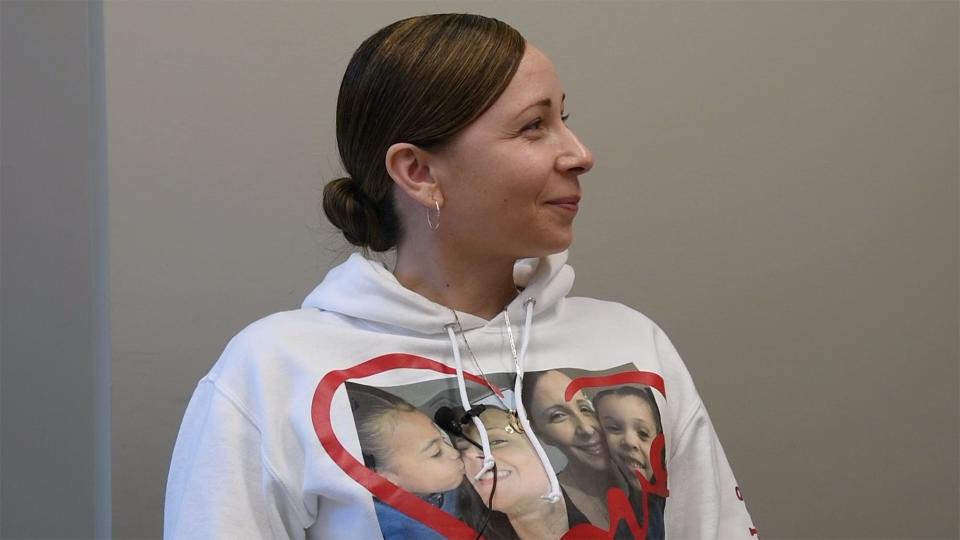
Marisa did very well in school, her mother said. She tested at near genius IQ, her mother said, and was among the students in the high-achievers group. “Looking back,” Marisa’s mother said, “she was the good one.”
It wasn’t until she was in middle school that she believed she’d ever have a chance to go to college, Marisa said. Some of her teachers at Hannah Penn Middle School encouraged her to prepare for higher education, telling her that she was bright and had a lot to offer. She dreamed of being a teacher. She liked kids and was the neighborhood babysitter growing up.
After graduating from William Penn Senior High School, she went to Millersville University, studying education with the goal of being an elementary school teacher. One of her teachers helped her pay for college, Diane said.
While at Millersville, a friend introduced her to Robert Brown III, as he was known then. He was working as a police officer in Baltimore County and would drive to Millersville to visit her. Sometimes, she’d visit him at his home in Maryland. Eventually, Robert moved to the Spring Grove area to be closer to her.
After she graduated from college, she got a job teaching at Chapel Hill Elementary School in Perry Hall in Baltimore County and continued to date Robert. They were together, on and off, for seven and a half years.
She doesn’t know how true it was at the time, but she felt that she found something in Robert that had been lacking in her life – a family life, stability and love. “I guess I sought to have a life different than what my life was growing up,” she said. “I thought I found something better.”
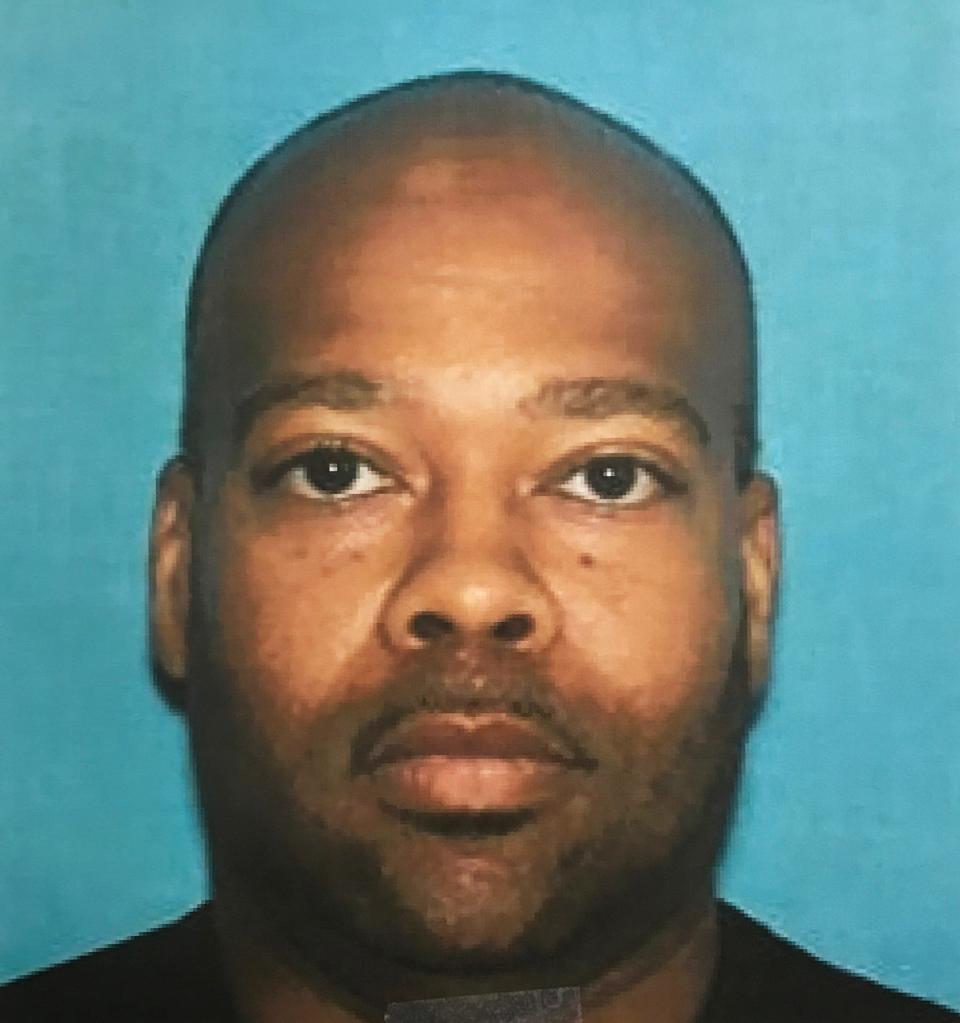
But she could feel something was wrong. “Looking back,” she said, “I could see when things were going his way, things were good.” When things didn’t go his way, they weren’t. He was never physically abusive, she said, but he was verbally and emotionally abusive. “He was the type that things I’d confide in him, he’d bring up and use against me,” she said. “He could be very aggressive and just downright mean.”
A couple of times while they were dating, she would leave him. Robert would be “very apologetic,” she said, “expressing that he wanted to do better. I guess I felt confident he was trying to be a good man, a better person.”
They were married in January 2014. She was pregnant with their first child then, Giana, born on Jan. 24. Aaminah was born about 18 months later, on June 8, 2015.
After they were married, they changed their last name to Vicosa. Robert wanted to change his name because, like Marisa, his father had been absent during his upbringing, and he wanted to jettison any vestige of the man. He selected Vicosa because it was the name of a town in southeast Brazil that, centuries ago, served as a sanctuary for escaped slaves. “He was intelligent and studied and knew a lot about those types of things,” Marisa said.
The marriage worked, sometimes, following the template established while they were dating. They went to counseling, Marisa said, and she believed Robert wanted to change. Marisa dedicated herself to saving the marriage. “I guess I saw marriage as an obligation, and I wanted to do everything I could to try to make it work,” she said. “I think he tried. I think he started out trying, but eventually that led to manipulation.”
And then, she said, “Things became incredibly difficult when he was terminated from the police department.”
'He thought he was better and smarter than anybody else'
During her daughter’s marriage, Marisa’s mother knew something was wrong but didn’t know the full extent of it. Marisa had told her things about the marriage that concerned her. Something just wasn’t right, Diane said.
But, Diane said, “Up until that point, he never physically abused her or the kids.” She just knew “something else was going on.” Marisa’s younger brother, Agustin Ayala, said, “I don’t think my sister was ever very happy in that relationship.”
Diane never liked Robert. “His personality was that he thought he was better and smarter than everybody else,” she said.
'He just lost it'
Robert Vicosa, it could be said, wasn’t an exemplary cop.
He joined the Baltimore County department on Dec. 11, 2002, and, according to department records, was first disciplined in October 2007 for failing to show up for a district court hearing. He was also disciplined for the same reason in June 2008.
In June 2019, after he had been promoted to sergeant, he was accused of engaging “in an ongoing course of improper conduct with three female subordinates (officers),” according to department records. Specifically, he was accused of watching “inappropriate videos in their presence, making inappropriate remarks of a sexual nature, and leering.” An investigation substantiated the accusations and, after a trial board, he was docked 45 days of paid leave and demoted two ranks to officer.
In March 2021, he was accused of insubordination, refusing to attend required training sessions, sleeping on the job, and conduct detrimental to the department, according to the records. Robert requested a trial board be convened to hear the charges, but he was fired before it could meet. Later, on Aug. 3, 2021, a trial board found him guilty of all charges and upheld his dismissal.
Vicosa's record: Cop suspected in kidnapping has work history dotted with insubordination, improper conduct
He did not take it well.
Marisa said he didn’t discuss the charges in detail. She did read the document outlining the accusations. Robert admitted to joking about the R. Kelly case, which involved bizarre sexual accusations and was in the news at the time, but he denied most of the charges. He told her that he had been targeted and that a lot of other officers were out to get him because he was tough on them and held them to account for their actions. He told her that the things he was accused of doing – at least the things he did not deny – did not call for demotion or termination and that other people in power had gotten away with much worse.
“One day,” Marisa said, “he just lost it.”
They were in the kitchen, talking. The girls were in an upstairs bedroom of their Pleader Lane suburban-style home in Windsor Township with Robert’s grandmother, who periodically came to visit. The talk turned ugly, and Robert became argumentative. At one point, Marisa mentioned that she had asked him to do something, and he hadn’t done it.
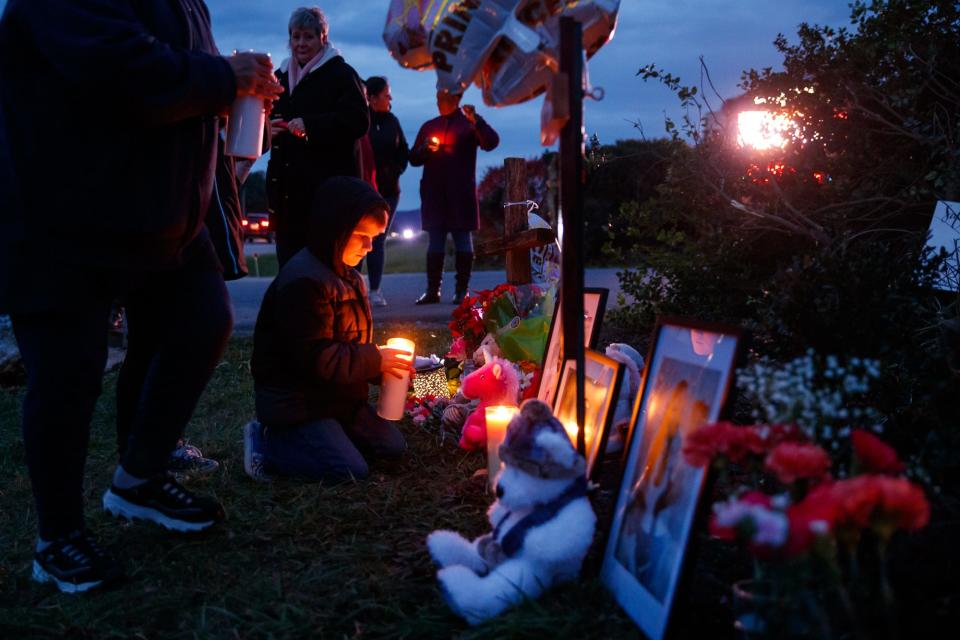
“That just set him off,” she said.
He started destroying everything, she said. He threw things. He broke a pantry door. He threw chairs and appliances and flipped a table over.
Marisa retreated to the bedroom to be with her daughters. She could hear her husband downstairs destroying the house. It was terrifying, she said. “That was the first time he had gotten like that,” she recalled.
The next few days, she spent daytime hours away from the house with her daughters while Robert cleaned up the mess he had made.
Not long after that, in July 2021, she was showering when Robert barged into the bathroom and began screaming in her face and blocking her from leaving the small room, she recalled. She asked him to let her leave and he responded with anger, spitting on her as he screamed at her and calling her “a horrible mother and a horrible wife,” she said.
She kept asking him to let her out of the room. He did not retreat.
Finally, he left the bathroom and went to an adjacent bedroom, where their daughters were with his grandmother. “He started telling my daughters I’m a horrible mom, what a horrible mother I am,” she said.
That was the final straw. She left the house and went to her mother’s home in the east end of the city.
He was not pleased about that.
He refused to allow her to see their daughters unless she agreed to terms that he had dictated. “He didn’t want my daughters around my family,” Marisa said. “He didn’t want them at my mother’s house. He was very controlling.”
Marisa filed for custody, but initially she had difficulty having the legal documents served. To avoid service of the papers, Robert was staying at the home of one of his former colleagues, a Baltimore County officer named Tia Bynum, who lived about 10 minutes away from their home. Marisa said she didn’t know the nature of Robert’s relationship with Tia. He wouldn’t tell Marisa where their daughters were staying, she said.
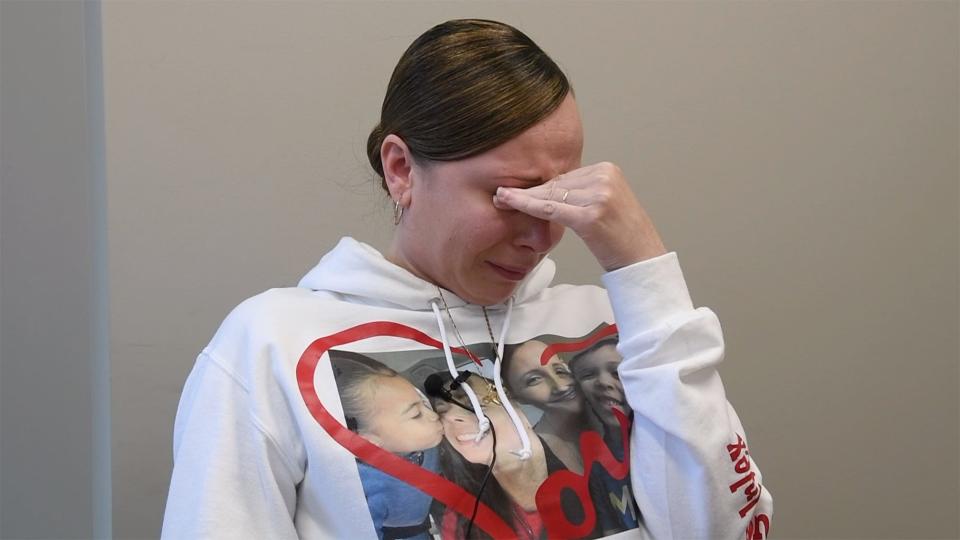
Finally, in September 2021, the custody papers were served, and Robert agreed to 50-50 custody, an arrangement called 5-5-2-2. Marisa would have the girls for five days, and then they would be with their father for five days, and then they’d return to Marisa for two days and after that, to Robert for two days before the cycle began again. Marisa had asked the conciliator for custody during the week, since she had been homeschooling the girls, and as a teacher, she was more than qualified to make sure their educations were not sacrificed to marital discord. The conciliator concluded that Robert seemed like a smart guy and “looks like he could figure it out,” Marisa recalled.
Marisa wanted the split to be as amicable as possible. She told Robert she didn’t want a divorce unless he wanted one. She told him, “I don’t want anything. No alimony. No child support. You can keep the house.” The house was in her name, and she told him she would sign it over to him.
Robert didn’t want to talk about it. “It was just every attempt to communicate was met with aggression,” she said. “There was no talking to him. I tried to talk to him, but it always led to arguments. I knew he was angry. I knew that, in his mind, I had betrayed him.”
She was worn down.
After all she had been through, she said, “I guess I just wanted peace.”
'I was going to die'
Nov. 11 was her birthday.
That Thursday in 2021, she got a message from Robert inviting her to come to the house Friday evening to have birthday cake with their daughters. The next day, he sent her a message asking whether she was coming over. She replied that she’d come over when she was finished with work. (She works from home.)
She finished work late, and between 8 and 9 p.m., she went over to the house on Pleader Lane. She had cake with her daughters and after they finished, Robert sent the girls upstairs to be with his grandmother, who said later that she was sleeping. As she began to leave, Robert called her back into the kitchen. “I got something for you,” he told her.
She told him, “You didn’t have to get me anything.” She wasn’t expecting anything, she said later.
When she returned to the kitchen, Robert was looking around, as if he had misplaced the gift. He said, “It’s a bracelet.”
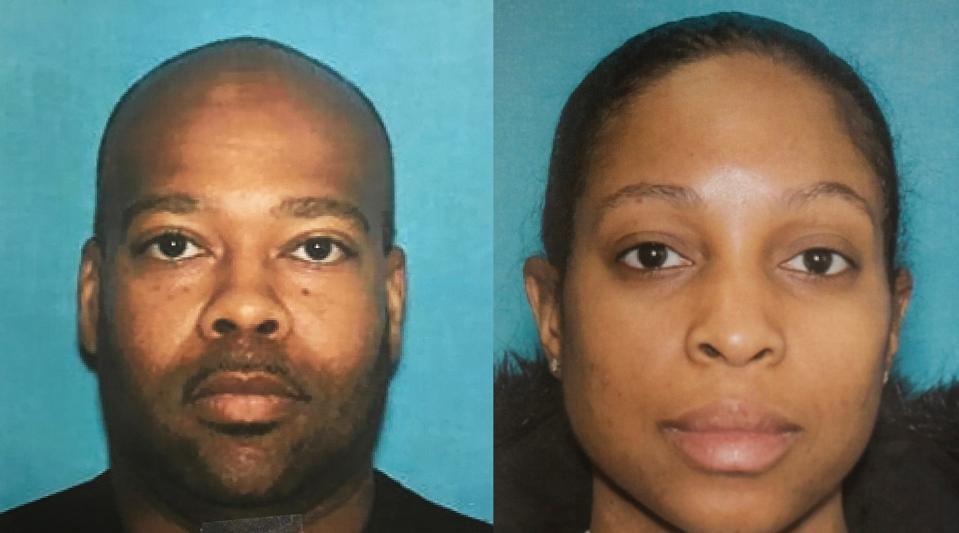
As soon as he said that, Bynum appeared in the room. She had been hiding in the dining room, and Marisa believes that “bracelet” was a code word for her to enter the kitchen.
Robert told Bynum, “Grab her.”
Then he approached Marisa and held a gun to her head.
Marisa screamed. She was in shock, disbelief. She was not sure what to think.
Robert barked, “Shut up. It wouldn’t be good if anyone came downstairs.”
He directed Marisa to the basement, at gunpoint. Robert and Bynum bound her to a table with zip ties and rope secured around her wrists and ankles.
“At that point,” Marisa thought, “I was going to die.” Her primary concern at the moment was what was going to happen to her daughters after they killed her.
Bynum stood by, holding a pistol, as Robert scolded her. “How could you do this to me?” he said. “I did everything for you. I’m the best thing that ever happened to you. How could you leave me?”
Marisa tried to answer intelligently – a difficult thing to do while bound to a table with a gun pointed at your head – and fell back on instinct to extricate herself from this dire situation alive. She had to be agreeable, she concluded.
They untied her and while Bynum held her at gunpoint – she had a small gun, Marisa recalled, “a girl gun” – Robert went upstairs. She pleaded with Bynum, “Why are you doing this to me? I didn’t do anything to you.”
Bynum replied coldly, “You have to talk to him.”
Robert crushed up some pills – she's not sure what they were – and made her snort the powder and forced her to smoke some weed. He took her upstairs to the living room and sat her on the couch. Bynum was in the kitchen, watching.
Robert told her he was going to have sex with her and asked whether she wanted to do it in on the couch or in the bedroom.
“No, no, I don’t want to do that,” Marisa told him.
He took her to the bedroom. He was going to rape her while Bynum recorded it. Marisa kept saying no. Eventually, Robert asked Bynum to leave the room. She rolled her eyes and walked out. Then Robert raped Marisa.
After, Marisa passed out. “I guess I was high,” she recalled.
The next morning, she noticed on her phone that she had missed calls from her mother and her brother. Her mother was concerned that she hadn’t returned to her home. With all she knew, her mother said, “I couldn’t believe Marisa would stay there that night. I got me thinking that something was not right.”
She told Robert, “I’m going to have to talk to them.” Robert warned her not to say anything that would raise suspicion and said, “If they show up, it won’t be good.”
Marisa called her brother and assured him she was fine. She told him that the girls were sick, and she was staying at the house to take care of them. She had purportedly been texting with her mother, but Diane said the texts didn’t sound like her daughter. There was something off about them. And she didn’t believe that Marisa’s daughters were ill. The girls had just been at her home, and they seemed fine.
Marisa had picked up the ingredients for her mother to make fudge for a family gathering that weekend. Marisa told Robert that she had some groceries in her car, and she had to drop them off at her mother’s house.

Robert drove her to her mother’s house. She went in, put the groceries on the kitchen counter and left. She thought she didn’t want her mother to be suspicious, something Marisa believed would endanger her mother’s life. She thought it was the best thing to do at the time. A surveillance camera recorded the visit, and Diane said when she watched it, it seemed odd. She could see her daughter enter the house while Robert stayed on the porch and watched her through the front door.
Diane called Marisa, but she didn’t pick up. She texted her daughter, but the responses didn’t sound like Marisa. “All kinds of things were running through my mind,” Diane said. None of them were good.
Marisa and Robert returned to the house on Pleader Lane. She didn’t have much choice in the matter. Robert told her he wanted her to return to his home and she had to pretend to agree. It wasn’t difficult. He had a gun.
She stayed in a bedroom much of the day. Later, Robert entered the bedroom and told her to perform a sex act. She shook her head and said, “No.”
Robert made it clear that non-consent was not an option. “You’re not understanding the situation,” he told her.
On Sunday, he kept telling her that he wanted her to return home and that everything would be like it was before. Marisa agreed with everything he said. She thought that was her only way out of this alive. She asked to be able to go to her mother’s house and get some things and her laptop for work. Robert agreed. Marisa wasn’t sure what to make of it. She was in disbelief that he would let her go.
He told her he would take her to her mother’s house. Marisa said she didn’t think that was a good idea. It would look suspicious, she reasoned, and he didn’t want to raise suspicion.
He agreed, with a warning. If she called the police or told her mother what was happening, he promised to kill her. He promised to kill their daughters. He promised to kill her mother, her brother, her nieces and nephews. He would kill everybody.
She was terrified as she walked to her car. She had no idea what was going to happen. She had one thought: “I’m going to be shot in the back of my head before I get to the car.”
'Like living in a movie'
It was, she said, “like living in a movie,” a horror movie. She couldn’t believe what was happening. But it was real, too real.
She drove directly to her mother’s house on Wellington Street. She thought she may be followed, or that her husband had placed a tracking device on her car. Previously, she suspected her husband had been stalking her. He said things that indicated he had been following her. Her suspicions were right. Later, she found a notebook – presumably Bynum’s because it didn’t contain her husband’s handwriting – that detailed a conversation she’d had in her car. She believed her husband planted a listening device in her car.
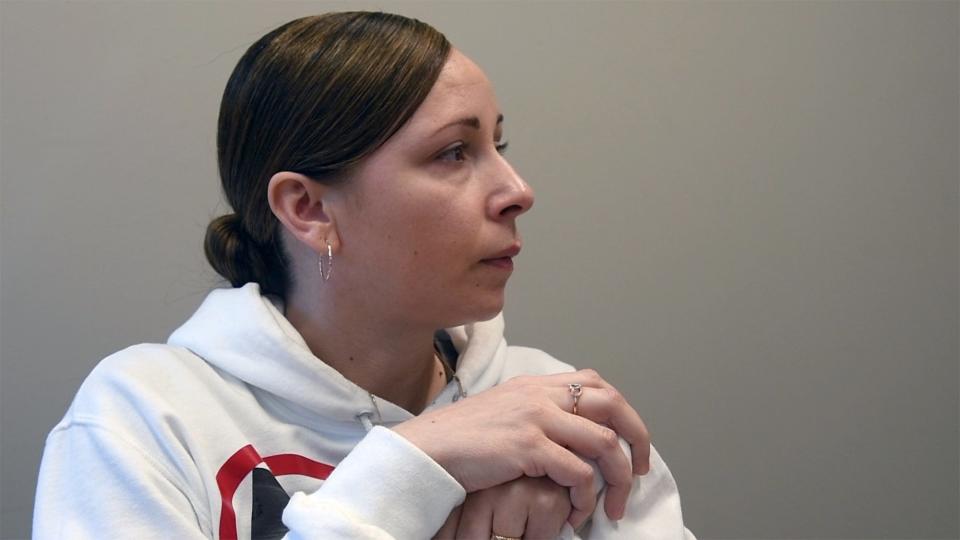
As she drove, she thought, “I have a choice to make. Do I go to the police, or do I try to handle this myself? Do I try to get a gun myself and go back and kill Robert before he has a chance to kill anybody?”
She wondered whether the police would be able to intervene before Robert carried out his threat to kill everyone.
It was terrifying that she was even having that thought. She decided to go to the police, she said, “because that’s what the law says you’re supposed to do.” It was the right thing to do, although later, it wouldn’t seem so.
When she arrived at her mother’s house, some of her nieces and nephews were visiting. She worried about their safety. She gathered some things and then called her mother into the bathroom. She told her, “Robert and Tia are trying to kill me.” She said if the police showed up, she knew that Robert was more than capable of killing all of them before the cops got through the door.
She told her mother to get the children out of the house and take them someplace public where they would be safe. Diane took her grandchildren - the oldest was 18 - to Wal-Mart in East York and told them to stay close to people just in case Robert or Tia were stalking them with harmful intent.
Diane drove to the York City Police department to report what was happening. The city police advised her to call 911 since it was outside their jurisdiction.
Meanwhile, Marisa had driven to the East York Target, thinking that if Robert was tracking her, she could explain that she stopped at the store to get hair products for the girls.
She knew where the break room was in Target, at the back of the store. She asked the workers there to call the police; she needed help.
A Springettsbury Township Police officer arrived, and after hearing a short description of what had happened over the past two days, he told her it wasn’t his department’s jurisdiction. He called the York Area Regional Police - now called the York County Regional Police - which patrols Windsor Township.
A York Area Regional officer drove her to the station and placed her in an interview room. A woman named Laura Wilson, the desk officer, took her statement. Another officer – perhaps a detective – was in the room too.
After she gave her statement, the officers left the room to discuss what to do.
When the officers returned, they advised her to seek an emergency protection from abuse order. They would also ask the district judge to issue a search warrant for the Pleader Lane home. They also suggested that it would be a good idea to go to York Hospital and have a rape kit completed. They told her it would help. “At that point,” she said, “I felt I had to prove what I was saying was true.”
They took her to the courthouse, where District Judge Ronald Haskell, over Zoom, approved the emergency PFA and issued the search warrant. Then, she said, Officer Justin Main drove her to the hospital, and she underwent the examination.
At about 3 a.m., she recalled, Cpl. Daniel Miller and another officer showed up at the hospital. They looked worried, she said. For a moment, she believed, “They were going to tell me my girls were gone.”
She said Miller, understanding the life-and-death gravity of the situation, had wanted to execute the search warrant as soon as possible, as soon as the manpower could be mustered to ensure it was done in as safe a manner as possible. She said Miller told her that the chief, Tim Damon, shot that down, saying that it would be better to wait until Monday morning when the girls were on the school bus. She didn’t know at the time that Lt. Kenneth Shollenberger, Miller’s direct supervisor, and Damon declined to go on duty to supervise the police response. (Coincidentally, Damon lives near the Vicosas’ former Pleader Lane home.)
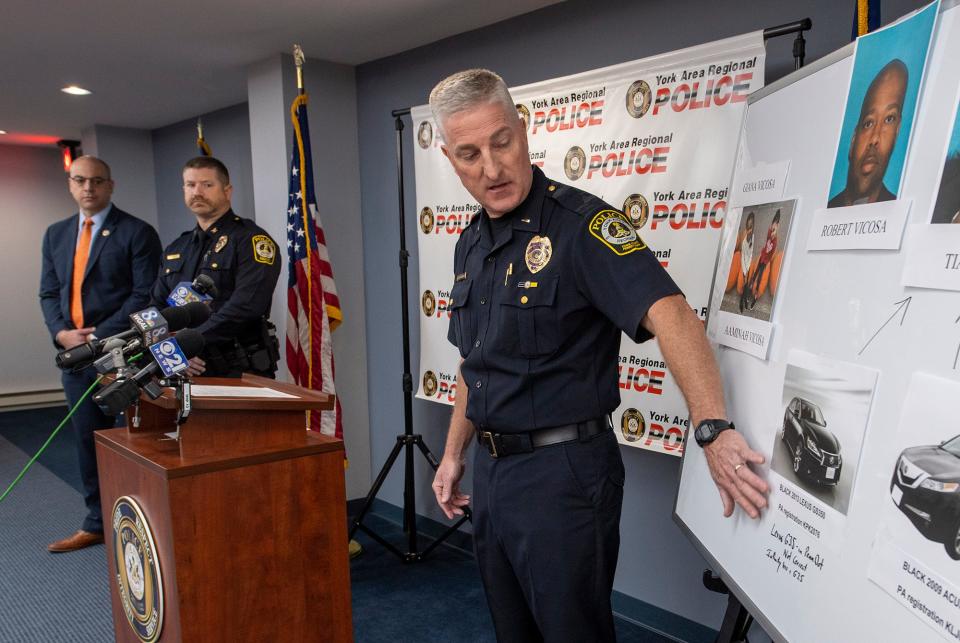
Marisa told Miller that she homeschooled her daughters and that they wouldn’t be on a school bus in the morning. She asked to speak to Damon.
She said Miller got on the phone. She’s not sure who he was talking to – later, she would learn that he was speaking to Shollenberger, his direct supervisor – but when he got off the phone he appeared to be aggravated and frustrated that his superiors were hesitant to act in what he believed was a dangerous situation.
When Miller got off the phone, Marisa recalled, he seemed deflated.
It was evident, she said, “they didn’t have a Plan B.”
She said, “They had no answers for me.”
She said Miller told her that not many people are aware of it, but she could go to the District Attorney’s office and file a private criminal complaint against the chief.
At about 5 a.m., she said, Miller drove her to a hotel and checked her in anonymously. She said he paid for the room using his personal credit card.
Taking matters in their own hands
When police declined to act, Marisa’s family and friends took matters into their own hands.
Diane and Agustin went to the home of her youngest brother, Dustin, to let him know what was going on. Dustin, Agustin and two family friends armed themselves and drove to the Pleader Lane home.
“They were going to kill Robert,” Diane said, and in the process, rescue Giana and Aaminah.
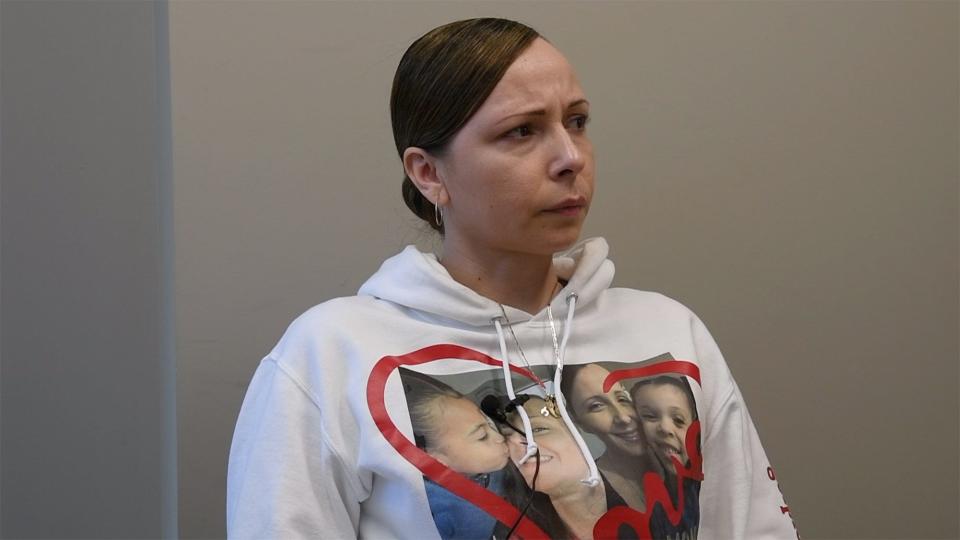
They entered the house through a sliding glass door and searched, Diane said. Nobody was there. They found the room in the basement. All they found, in a back room, was the table Marisa had been bound to. In the house, Diane said, they found a satanic bible and a statue of a demonic figure. Marisa’s underwear was wrapped around the statue’s head.
'I thought they were going to find him'
The next day, Monday, Nov. 15, Marisa returned to the courthouse. She went to the District Attorney’s office and filed a private criminal complaint against Damon. Then she was placed on the list to appear before a judge to have the emergency PFA converted into a temporary PFA.
At 2 p.m., she entered the courtroom. It was crowded. “It was like walking into a room full of abused women,” she recalled, “listening to everybody’s horrific stories of abuse while waiting for my name to be called.”
It appeared that she was low on the list. At one point, a sheriff’s deputy entered the courtroom, looking panicked, she recalled. The deputy got the judge’s attention and asked him to take her case immediately. They were prepared to execute the search warrant and needed to proceed as soon as possible. The judge called her to the bench, asked her a few questions and signed the order.
The police were ready to act.
At 3 p.m., the police descended on the Pleader Lane home to serve the PFA and the search warrant.
Nobody was home.
Robert’s phone pinged to Bynum’s home, Marisa said. Police obtained a search warrant for her home and served it at 4 p.m. Robert and the children weren’t there. Bynum told police she didn’t know where they were, even though phone records obtained later showed she was in constant contact with Robert. She also told police what Marisa described as “a messed-up story,” saying she was the victim, that it was Marisa and her family who were trying to attack her.
Even though police had information that Bynum was an accessory in the crimes committed against Marisa and the abduction of her daughters, they did not take her into custody. Nor did they order surveillance of her.
Marisa returned to her hotel room and awaited news. Marisa’s mother, who was also staying at the hotel, was hopeful. “I thought they were going to find him and arrest him and bring my granddaughters back,” she said.

'This has to be someone else's life'
On Tuesday, Marisa said, Shollenberger came to the room and told her that Robert had stolen a woman’s car at gunpoint. He had run the car he had been driving into a creek on Monday, and after spending the night in a camper trailer on the property of a Red Lion area woman, he held the woman at gunpoint and took her Volkswagen Jetta. Giana and Aaminah had been with him.
Marisa thought, “Finally, they believe me and they're finally going to begin moving forward.”
That day, police returned to Bynum’s home, but she wasn’t there. Meanwhile, Baltimore County Police suspended Bynum that day. Marisa was upset they didn’t detain her the previous day. On the one hand, she said, “I knew it was my word against theirs. But it appeared to me that (the police) were being very cautious because they were dealing with police officers.”
The hours ticked by, slowly. “I was just scared and confused,” Marisa said. “I was trying to remain hopeful. I just wanted my babies back. I felt helpless but hopeful at the same time.”
Meanwhile, police in Pennsylvania and Maryland conducted a manhunt for her husband, Bynum and her daughters. There was news that Robert and Bynum had carjacked an SUV at gunpoint in Cockeysville, Maryland, just north of Baltimore. They forced the man to drive them, and the girls, around the Baltimore area for a few hours and released him unharmed.
Marisa did not have a good feeling about how the manhunt was going. She felt she had to do something. On Thursday, Nov. 18, she asked her brother to drive her to Maryland to look for Robert and the girls, a long shot to be sure, but it was something – and better than sitting in the hotel room alone with her thoughts. Other family and friends had been searching for Robert and the girls since they had disappeared. Diane enlisted the help of people she used to work with – truck drivers who did a lot of deliveries in Maryland – to be on the lookout for her son-in-law and grandchildren.
Agustin said, “My head was all over the place, trying to figure out what was going on. I just wanted to try to help my sister.”
They were driving back from Maryland, on Interstate 83, when Marisa’s phone rang. It was Shollenberger. She was terrified to answer it, fearing the worst. She did answer, and Shollenberger asked her to meet him at the hotel. He wanted to give her an update. “What is it?” she asked. He told her he didn’t want to do it over the phone.
She hung up. She felt dread.
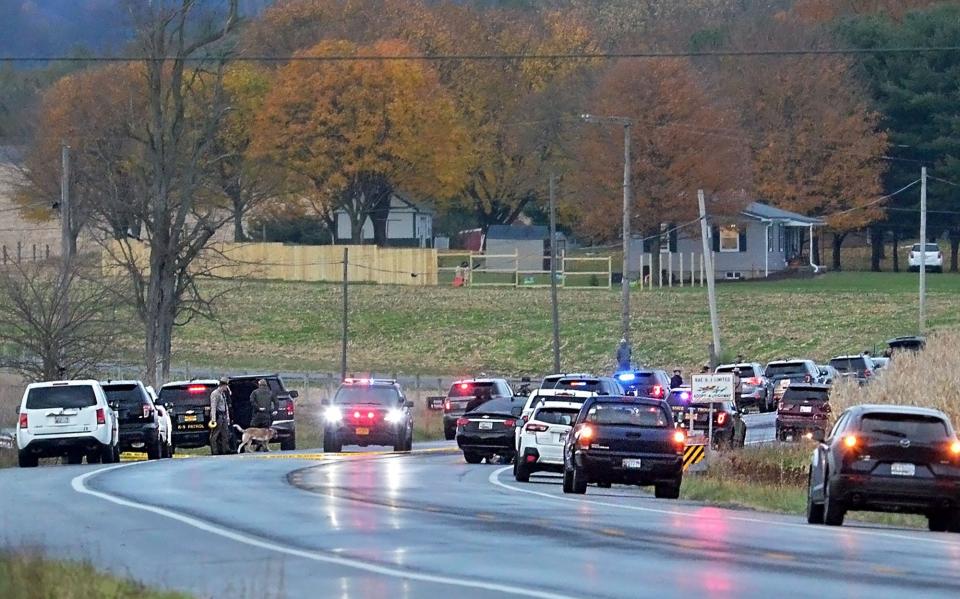
Then her brother’s phone rang. A friend told him that something was on the news about a car crash in Maryland that involved Robert Vicosa.
Marisa called Shollenberger back and asked about the car crash.
Shollenberger told her, “Giana is gone.” Aaminah, he told her, still had a pulse and was taken by helicopter to a hospital in Smithsburg, Maryland. He told her to return to the hotel and he would arrange transportation to the hospital. Marisa just wanted to be with her daughter.
Marisa told her brother. He screamed. At that moment, Agustin felt a surge of emotion. He said, “I wanted somebody else to feel that pain too.”
She arrived at the hotel. Shollenberger was waiting for her. She could see it on his face. He didn’t have to say anything. She knew. He told her Aaminah didn’t make it.
“I just remember screaming and crying,” Marisa said.
Her mother remembers just trying to hold on, to be there for her daughter. She remembers thinking, “This can’t be real. This has to be somebody else’s life.”
She didn't want to let go
Marisa would learn later that police had spotted Robert in Waynesboro, Pennsylvania, near the Maryland border. Bynum was driving. Robert was in the back seat of the stolen Ford Edge with the girls. Shortly after crossing into Maryland on Route 418, the car veered off the road and struck a culvert. Police determined that Robert first shot Bynum and then murdered his daughters before turning the gun on himself.
Marisa wanted to get to the hospital, and police rushed her there, hitting 100 mph as they sped to Smithsburg. At the hospital, she was met by doctors, a counselor, Maryland law enforcement officers and FBI agents.
They asked her whether she wanted to spend some time with her daughter. She hesitated.
“I wasn’t sure it was the right thing to do,” she said, her voice cracking and tears cascading down her cheeks. She paused. And then said, the words catching in her throat, “I didn’t know if that would be my memory of her I’d have forever.”

She decided she needed to see her daughter. She needed to say goodbye.
She was escorted to the hospital room. “There she was,” she said.
She crawled into the bed and embraced her daughter, once so full of life, now lifeless. She held Aaminah for several hours; she’s not sure how long it was. It seemed like an eternity.
She didn’t want to let go.
'It baffles me'
“My daughters could have been saved,” Marisa said.
She believes that had police acted immediately and served the search warrant and PFA that Sunday night or early Monday morning, her daughters would still be alive, and she wouldn’t have to live with the pain, the grief, the loneliness, the emptiness.
“What I want the police to know, what I want law enforcement to know, is that we … are required to rely on them for justice, so they have an obligation to get it right,” she said.
Last month, Marisa and her lawyer, Philadelphia attorney Harold Goodman, reached a $3 million settlement with the York Area Regional Police Department for its repeated missteps that she believes led to her daughters’ deaths.
“I think there’s more to be done in terms of leadership of the police department,” she said. “I think there’s been no real accountability. It baffles me why that leadership is still in position. More than anything, I would hate to have this happen again.”
She and Goodman recently met with the York County District Attorney’s office to discuss what steps were being taken to reform law enforcement policies to address the errors made in this case. The DA’s office has said it is reviewing the policies and procedures, an effort that is ongoing.
Goodman said, “What Marisa has been forced to survive can’t be translated into words. She is unbelievably courageous and strong and has committed herself, as has my firm and I, to not let this go back to the way it was.”
The police department, in a response filed in York County Court after the settlement was approved by a judge, asserted that it had done nothing wrong.
There have been some repercussions. In March 2022, Cpl. Daniel Miller was demoted to Officer, according to police records. The reason for the demotion was not specified.
Damon, who has repeatedly not returned calls requesting comment, remains the chief. Calls to Miller were not returned either. David Naylor, an East Manchester Township supervisor who serves as chairman of the regional police department’s commission, said the commission's solicitor advised them not to discuss the matter beyond the department’s legal response. Naylor also said he was unable to discuss Miller’s demotion because it was a “personnel matter.”
Lack of transparency: York Daily Record takes DA to court over Right-to-Know Law request in Robert Vicosa case
A lonely existence
Marisa said, “It’s like your brain is trying to conceive something that’s impossible to conceive.”
Did she ever believe that her husband could do something so horrible, so unthinkable?
She paused and thought about it.
“There’s a lot of evil in the world,” she said. “Over time, my husband was becoming more and more evil. He was allowing the evil to consume him.”
She said, “I think mostly, in terms of his mentality, he saw me, and he saw his daughters, as his property.”
For a long time after that horrible week, she said her life was “just about getting the strength to get out of bed.” She had to try to arrange her daughters’ funeral, she said, “in the midst of feeling like you have nothing.”
She has prayed a lot and has had a lot of support from her family and friends.
But hers is a lonely existence.
“I can be surrounded by a hundred people, but I still feel alone inside,” she said. “I keep a lot of it inside. I have my moments but try to do it in private. Every day, I have to give myself permission to live, to try to find happiness in each day and to accept that God has determined that it is not my time.”
Columnist/reporter Mike Argento has been a York Daily Record staffer since 1982. Reach him at mike@ydr.com.
More by Argento: How a bloody scalp found on a rural PA road led cops to a killer
This article originally appeared on York Daily Record: Marisa Vicosa describes the terror that led up to 2 daughters' murder

